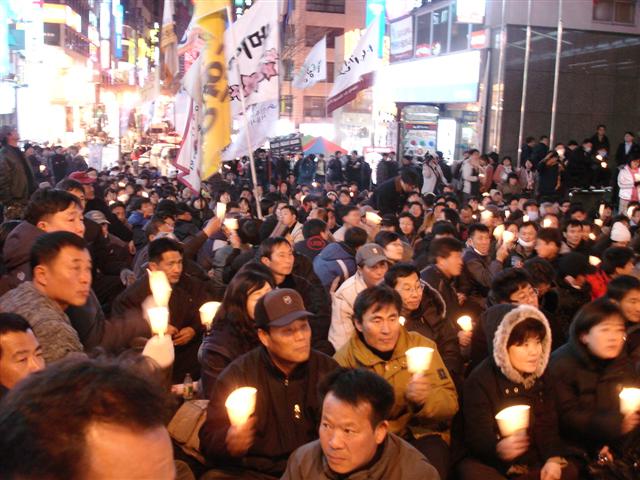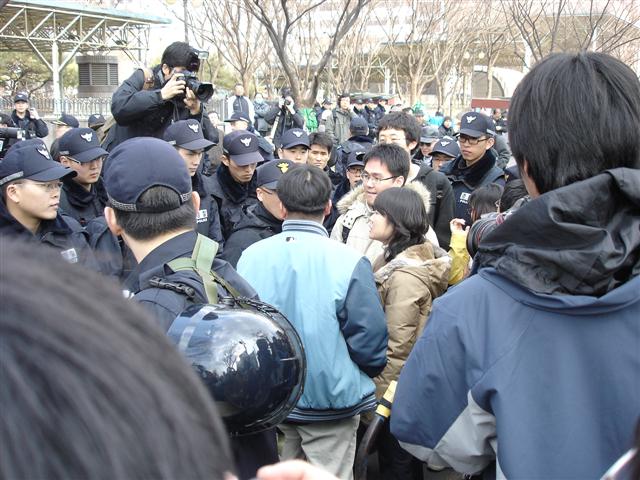KoA No FTA Newsletter #2
No FTA Newsletter
Official News of the Korean Alliance Against the Korea-US FTA
www.nofta.or.kr nofta@hanmail.net
Vol. 1, No. 2, February 14, 2007
Farmers Release Animals in Protest, Five-hundred Attend All-night Vigil
Wednesday, February 14, 2007. On Monday, the second day of Korea-U.S. FTA negotiations, South Korea’s farmers, numbering around 200, released a pig and several goats in Seoul’s very busy district of Myung-dong. The farmers had come from all over South Korea in order to protest the trade deal that would bring the most direct harm on the country’s farming community. In the middle of the protest, one farmer was arrested, and all the animals were taken by the police.

In another area of Seoul, around 300 people from labor and civil society organizations held a rally. Kang Ki-kap, a member of the National Assembly, said in a speech, "I took to the street because I could not sit and watch as our country is being sold off in a disastrous trade deal."
Everywhere, police supression was heavy. The afternoon rally at Jongmyo Park, which was encircled by police buses, was met with hundreds of riot police who surrounded anyone who looks like a protester. "The right to assemble is our fundamental right," said Oh Jong-ryul, Co-Chair of Korean Alliance Against the Korea-U.S. FTA, while facing the police. "To deny this right at a time when government proclaims democracy is a crime against the people, but we will not stop our effort to claim our rights and protect our livelihood." A peaceful march that was planned from the park had to be cancelled as the police blocked the front and said in a loudspeaker the protesters must disperse individually.
In the evening, farmers, unionists, students, and activists from various organizations, about 500, gathered in front of Myung-dong cathedral for an all night vigil. The songs and speeches and being together with fellow brothers and sisters seemed to lessen the coldness of the night. Choi Jae-kwan, Korean Peasants’ League’s Director of Policy, said in a speech, "the fight against Korea-U.S. FTA is a fight that unites all of us. The fight is tough, but our voice is being heard and our victory is inevitable." The protest continued all night long for about 200 people, mostly farmers. Next morning, the group split up and met with other organizations for several small demonstrations in front of the Grand National Party office, the ruling Woori Party office, and the Ministry of Foreign Affairs and Trade.
As the trade negotiations are happening, police suppression has never been harsh as it is now. The police have denied permission of any rallies against the FTA, and the dispatch of hundreds and thousands of riot police at every anti-FTA event is reminding many of us the difficult era of struggle for democracy in the 1980s. But the Korean Alliance Against the Korea-U.S. FTA is determined to
continue to mobilize the people and spread the message about unfair nature of this free trade agreement.

The 7th round of negotiations, which is at its last day in Washington, D.C, have seen some concessions from both the US and South Korea. The details have not been disclosed, but an agreement has been reached on industrial products to quicken the time for abolishing tariffs in both countries. On intellectual property, South Korea is moving toward accepting the U.S.’s demand to extend the term from 50 years to 70 years. However, no progress seems to have been made on investor-state claims clause, automobiles, and pharmaceuticals.
Under the trade promotion authority of President Bush, which expires on July 1, an agreement must be reached by the end of March in order to give the U.S. Congress 90 days to vote yes or no. Once in the hands of the U.S. Congress, the fight to stop the trade agreement becomes a different game. The Korean Alliance Against the Korea-U.S. FTA, seeing that the window for resistance is closing, is moving fast to mobilize for a national rally in March.
About sixty leaders of the National Union of Media Workers have been in a hunger since February 12 in front of the Seoul’s Press Center. A seven-hour cultural activity is going on today, and a closing press conference will be held in front of the Central Government Complex tomorrow morning at 10am.
KoA Protest Delegation Holds All-night Vigil, Congressional Briefing in D.C.
As the 7th round of Korea-U.S. FTA negotiations proceeds, protests in South Korea are being matched by protests in Washington D.C. Since their arrival on December 10th the Korean Alliance against the Korea-U.S. FTA’s (KoA) protest delegation has come together with American-based organizations and activists to engage in a diverse activities ranging from an all-night demonstration in front of the negotiations site to briefings with U.S. congress members. The delegation is made up of representatives from farmers’, labor, media, women’s, and civil society organizations in South Korea.
Formal activities began on Sunday (Feb. 11) with a morning press conference in front of the Washington Court Hotel, where the negotiators are meeting and sleeping, and an opening rally and march, which began at Washington D.C.’s Malcolm X Park and ended at Lafayette Park directly in front of the White House. The protest, co-sponsored by KoA and Korean Americans against War and Neoliberalism (KAWAN), drew participants from U.S.-based labor, civil society, immigrant and people of color organizations. Afterwards, the delegation moved to the front of the Washington Court Hotel where they pitched two tents and began a sit-in vigil that will continue throughout the week, day and night, as a symbol of opposition to the undemocratic nature of the official talks.
Activities continued on Monday, with a labor-led anti-FTA protest co-sponsored by AFL-CIO and Change to Win. At the conclusion of this event several members of the delegation and other protest participants attempted to enter the negotiations site to deliver their criticisms of the FTA to the negotiators, but were held back by security. Undaunted, the protestors elected to sit down in front of the negotiations site and stay their all night, demanding that their message be heard. The group maintaining the outside vigil has received donations of food, coffee, and blankets from local civil society and church groups and chased after U.S. Chief Negotiator Wendy Cutler on her way back from Starbucks, chanting “No FTA!”
On the morning of the 13th, representatives from KoA, the Korean Confederation of Trade ,and AFL-CIO held a briefing with U.S. Congress members. The event was attended by around fifty staff members from the Senate and House. According to delegation participant Dong-gyu Kim (policy director of South Korea’s Korean People’s Solidarity), “staff members from at least 15 states attended the briefing. It is clear by the overall level of participation and the serious questions posed by the audience that this event was important in increasing the level of interest in and consciousness about the Korea-U.S. FTA.”
Activities will continue tomorrow with a forum on the Korea-U.S. FTA, Fast Track, and fair trade with American civil society organizations and representatives from the anti-Colombia-U.S. FTA struggle. A final demonstration will be held in the evening. Given the strong push for progress at this round of negotiations, with 18 major areas under discussion, an agreement reached on electronics, and large concessions expected from both sides, it can be expected that the delegation will maintain the strength of its resolution and opposition to the FTA until the last moment of the talks.
Limiting Access to Healthcare: FTA and Pharmaceuticals
South Korea, like many other countries, has a system of universal healthcare, which was first implemented in 1987. Although by no means comprehensive, this system currently, provides access to medicine and basic treatment at reasonably affordable prices. The Korea-U.S. FTA, however, stands to drastically undermine this system, in particular through its provisions on pharmaceuticals. This analysis looks at three problem areas: drug pricing, the FTA effect on Korea’s positive drug list system, and intellectual property rights.
Drug Pricing
Even with national health insurance many pharmaceuticals are very expensive for the majority of people in South Korea. Prices for innovative new drug are already in accordance with average factory prices in the 7 wealthiest countries (A7 countries: U.S., UK, Germany, France, Italy, Japan, and Switzerland). In some cases, prices are even higher in South Korea: for instance, the price of leukemia treatment drug Gleevec is $23 in South Korea while it is only $19 in the U.S. By demanding that all patented pharmaceuticals be innovative drugs and all innovative drugs be priced at the A7 average, the FTA stands to greatly exacerbate this situation, inevitably raising medicine prices to an unaffordable level for the public. The FTA does not recognize that ordinary people in Korea simply cannot meet the drug cost of people in the wealthiest nations.
Effects on the Positive List System
South Korea’s positive drug list, introduced last December, contains drugs that are proven to be efficacious, price-competitive, and covered by health insurance. The USTR Office has partially accepted this system, but is requesting the inclusion of expensive pricing for innovative drugs and, furthermore, the installation of an independent review board, thereby restricting the government’s authority to register drugs and determine their prices at affordable rates. An independent review board will most likely be unfamiliar with the actual economic and social conditions in South Korea and favorable to the interest of transnational pharmaceutical companies. As such it stands to compromise the health of the South Korean population in the interest of corporate market access.
Intellectual Property Rights
The protection of intellectual property rights through drug patents has been an important issue in the FTA. If the trade agreement is signed, it will extend the current term of patents by at least 5 years. In dollar amount, this would translate to 6 billion dollars of financial burden on South Korea’s national insurance system, resulting in increased prices across the board. The extension of patents would also prevent fair competition for domestic generic drug industries, restricting patients’ access to these lower-priced medicines. Further, the current FTA provides for pharmaceutical company’s exclusive rights to drug data. This data is essential in the production of generics worldwide. Currently, the percentage of generic drugs under national insurance is increasing every year; generic drugs, needless to say, are crucial in providing affordable medicine to the populations of both the U.S. and South Korea.
On November 4, 2001, the 4th WTO Ministerial Conference at Doha adopted the “Declaration on TRIPS Agreement and Public Health.” The Doha Declaration states that “the TRIPS Agreement does not and should not prevent members from taking measures to protect public health.” It makes clear that on the occasion of a clash, the right to a healthy life is greater than intellectual property rights. Although a tool of the WTO, the Doha Agreement at least sets as a minimum criterion that public health must be protected from the often irresponsible effects of economic pursuit. The Korea-U.S. FTA, in ignoring the public interest, plainly fails to meet the Doha Agreement.
This disregard for public interest is further evident in the negotiations process were a “big deal” exchange between South Korea’s pharmaceuticals and automobiles, and U.S.’s trade remedies is in the works. Pharmaceuticals, which provide an essential public service, should not be treated as a commodity similar to automobiles.
We can anticipate that the FTA will bring not only a rise in drug prices and treatment cost, but also a breakdown in South Korea’s healthcare system itself. Access to affordable and comprehensive healthcare is a public right that must be protected, and has priority over commercial interests. We cannot accept a trade deal that restricts this right.





